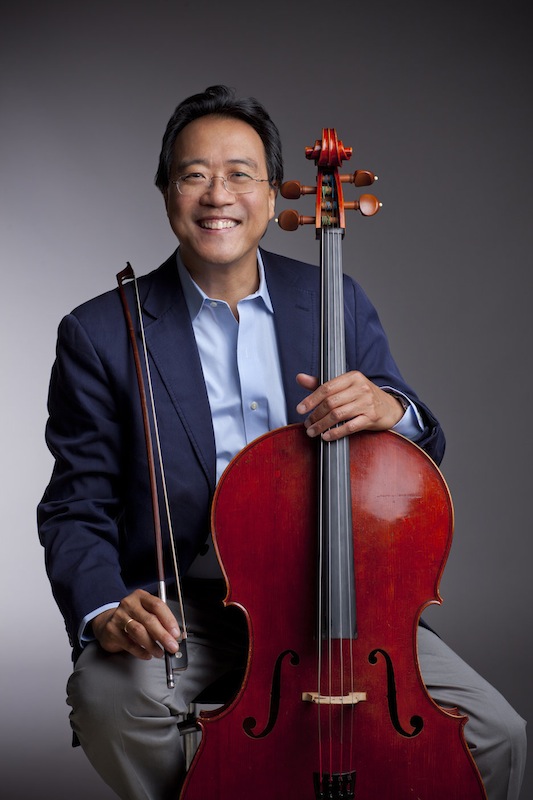Ma and Stott serve up rich and rewarding program for Celebrity Series
On a stage subtly lit in blue, white, and red, cellist Yo-Yo Ma and pianist Kathryn Stott began their Tuesday night concert presented by the Celebrity Series of Boston at Symphony Hall by dedicating a transcription of Fauré’s song Après une rêve to the people of France. On this occasion, the duo rendered Fauré’s graceful melody with strong emotion that eschewed mere sentimentality.
They then launched into their “Arc of Life” suite, a selection of 5 short pieces from their recent album of the same name intended to recall the journey from birth to death. This small suite, like the album, is bookended by two famous Ave Marias: Bach’s as arranged by Gounod, and Schubert’s. Ma leaned more toward the Romantic expressiveness of Gounod, rather than the precision of Bach, but when the time came for Schubert, the duo had settled enough for a gently emotional rendering.
Jean Sibelius’ charmingly nostalgic Was it a dream?, Op. 37, No. 4, and Debussy’s dark Beau soir rounded out the suite.
Sandwiched between these more familiar works, Danish composer Jacob Gade’s Tango Jalousie gave Ma and Stott the perfect vehicle to showcase their partnership as they played off each other in alternately teasing, combative, and seductive passages.
The first half of the program concluded with Shostakovich’s Cello Sonata in D Minor, Op. 40. While this sonata gave Ma ample opportunity for the rounded phrasing and singing sustained tones that are his hallmark, it was in the more frenetic, stormy moments that this performance stood out. The facility and energy with which Ma navigated quick changes from legato bow to pizzicato to strumming to bouncing bow rendered Shostakovich’s already intense music surprisingly thrilling.
The first Allegro highlighted Ma and Stott’s skill as interpreters as they traded the thematic material in perfect emotional sync, even seeming to match the timbres of their instruments. The second movement, also marked Allegro, showcased the beautifully rich and slightly raspy low register of Ma’s cello. In the Largo, Stott’s clean, biting bass chords provided a compelling, gritty backdrop to Ma’s refined phrasing. In the final Allegro, Shostakovich’s sly, humorous theme built up into a frenzy of quick changes of texture and technique; Ma and Stott navigated the music with an ease that revealed how perfectly paired their technical and interpretive powers are.
Italian cellist and film score composer Giovanni Sollima provided Il bell’antonio, Tema III. The newest work on the program, it offers a long, beautiful melody progressively intensified by thick piano chords, double stops and heart-wrenching slow glissandos.
After hearing Ma’s amazing command of these effects and his attention to the overall line of the piece, it is disappointing that he does not apply his skill more often to some of the more experimental and daring works of the 20th century. What an experience it would be to hear him play Berio’s Sequenza XIV or one of Saariaho’s many solo cello works.
The recital concluded with Cesar Franck’s Sonata in A Major for violin and piano, here arranged for cello and piano. Franck’s music has a tendency to be long winded, but in the hands of Yo-Yo Ma and Kathryn Stott, Franck’s massive melodies and complex harmonies took on an emotional immediacy that kept the audience’s full attention to the end. The third movement, Recitativo-Fantasia was particularly lovely; the duo turned the Recitative into a powerful plea before the forceful theme of the Fantasia took over.
The sold out crowd in Symphony Hall gave Yo-Yo Ma and Kathryn Stott a standing ovation, which precipitated three encores. Ma dedicated Elgar’s Salut d’amour, written as a wedding gift to the composer’s wife, to a couple in the audience celebrating their own anniversary; the duo’s light touch with this piece provided a nice contrast after the massive Franck. A transcription of Gershwin’s first piano Prelude recaptured some of the playful humor from the earlier half of the program, while Tchaikovsky’s Valse Sentimentale provided a fittingly graceful ending to the evening.
Posted in Performances




